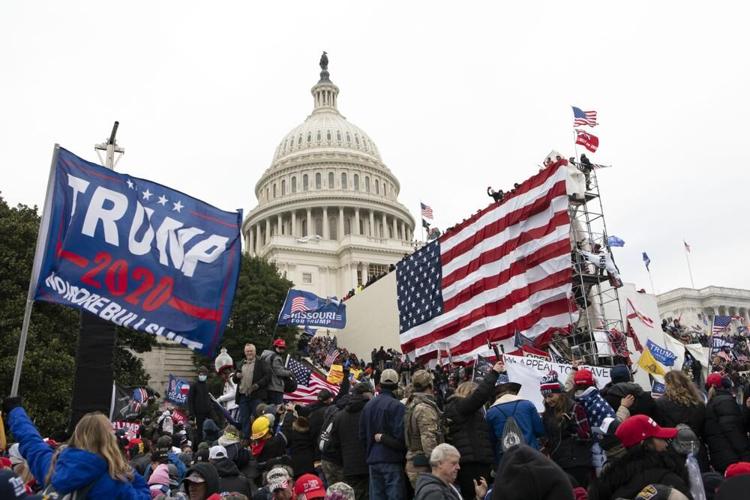Asian Americans critical of Trump’s policies
“As Asian Americans and Pacific Islanders, We Will Resist,” said a statement issued by Asian Americans and Pacific Islanders (AAPIs). “We stand at a critical juncture in world history. The election of Donald Trump as president of the United States represents a direct threat to millions of people’s safety and to the health of the planet.”
While expressing its commitment to equality, inclusion, and justice, “we pledge to resist any efforts by President-Elect Trump’s administration to target and exploit communities, to strip people of their fundamental rights and access to essential services, and to use rhetoric and policies that divide the American people and endanger the world,” the statement said.
Trump’s campaign used explicit racial appeals to win the support of disaffected white voters, promising to restore their economic and social standing by deporting millions of immigrants, building a wall, creating a Muslim registry, banning Muslim immigration, and punishing Black dissent.
“The actions of the Republican Hindu Coalition today do not reflect the breadth and diversity of the Indian American community, or our Diaspora,” asserted Bera at a press conference organized by the AAPIVictory Fund Jan. 31, at the National Press Club in Washington, D.C.
“I’m very troubled by the Executive Order,” Rep. Raja Krishnamoorthi, D-Illinois, told the media, especially as it affected Green Card holders. The Trump administration’s exemption of permanent residents soon after passing the Executive Order, he contended, was a “reversal” in the face of the public outcry, and insisted that the order itself was “an assault on the Constitution.”
Sunita Viswanath, a co-founder and board member of Sadhana: Coalition of Progressive Hindus, appealed to Indian Americans to “resist” the Trump order. The Sikh Coalition, an advocacy organization, strongly objected to the Trump temporary ban supported by RHC. “The Sikh Coalition rejects this order as unconstitutional and will continue to stand in solidarity with communities targeted by discriminatory policies,” the organization said, adding, “We support an immigration system that treats people with fairness and dignity, not one based on stereotypes masquerading as law,”
On the social media networking site Twitter, activist Deepa Iyer called for a “Twitterstorm” against RHC on Jan 31. The author of the award-winning book, “We Too Sing America: South Asian, Arab, Muslim and Sikh Immigrants” and a Senior Fellow at the New York City-based Center for Social Inclusion, Iyer tweeted, “Progressive Hindus stand w/Muslims, refugees, condemn #Muslimban; call out GOP Hindu Coalition.”
Meanwhile in the New York region, as many as 19 Indian-American academics from universities in New York, New Jersey and Pennsylvania joined over 4,000 scholars from prestigious institutions across the nation Jan. 27, opposing President Trump’s executive order last week for a suspension of visas and other immigration benefits to nationals from certain Muslim countries.
The academics that included Nobel laureates, members of the National Academy of Sciences and faculty and department heads of universities and educational institutions from New York to California, signed an open letter opposing Trump’s 90-day suspension of visas and other immigration benefits to all nationals of Iran, Iraq, Libya, Syria, Somalia, Sudan, and Yemen. The ban is likely to become permanent after the 90-day suspension period. As many as 90 Indian-American professors and other academics across the U.S. had signed the letter, including people from Columbia, Cornell, Harvard and MIT, among others.
The academics have outlined three main reasons for their opposition, including the executive order’s discrimination against a large group of immigrants and longtime residents of the U.S. which is based solely on their country of origin, all of which have a majority-Muslim population. This executive order “is inhumane, un-American and entirely disproportionate to the threat it is purporting to address,” the letter said.
“This executive order would significantly damage the United States’ reputation for academic excellence in higher education. United States research institutions directly benefit from the work of thousands of researchers from the nations affected by this executive order,” the letter said.“The United States academic community relies on these talented and creative individuals for their contributions to the cutting-edge research,” it added.
The prominent Indian-American academic signatories to the letter include Karna Basu, Associate Professor of Economics, Hunter College, City University of New York; Kalyan Chatterjee, Distinguished Professor of Economics and Management Science, Department of Economics, The Pennsylvania State University; Anind K. Dey, Professor and Department Head, Human-Computer Interaction Institute, Carnegie Mellon University; Sampath Kannan, Henry Salvatori Professor and Chair, Computer and Information Science Department, University of Pennsylvania and Yash Kanoria, Assistant Professor of Decision, Risk and Operations, Graduate School of Business, Columbia University. The academics urged President Trump “to reconsider his stance to be more consistent with the longstanding values and principles of this country.”
“The actions of the Republican Hindu Coalition today do not reflect the breadth and diversity of the Indian American community, or our Diaspora,” asserted Bera at a press conference organized by the AAPIVictory Fund Jan. 31, at the National Press Club in Washington, D.C.
LA Times reported that 28 other Asian American politicians in California and around the nation have sent a letter to President Trump asking him to rescind his executive order banning citizens of Syria, Iraq, Iran, Sudan, Somalia, Yemen and Libya from entering the U.S. for 90 days.
The letter noted that Asian Americans have been targeted with similar policies in America’s past, including the Chinese Exclusion Act in the 1880s, which was the nation’s first major law excluding specific immigrants from the county. During World War II, Japanese Americans were sent to internment camps.
“Your 2,800-word executive order drips with cruel irony as it turns away refugees trying to escape the same Islamic terrorism and violence that you naively claim will be repelled from our shores if we only embrace your bigoted and cowardly directive,” the letter stated
Meanwhile the Republican Hindu Coalition, which worked closely with Donald Trump’s presidential campaign and his transition team, is in the eye of a storm within the Indian-American community for its support of the President’s temporary ban on people from seven countries – an executive order that has itself brought forth an eruption of protest by many around the country.
“We applaud the Trump administration for taking this decisive move to protect our citizens from Islamic terror,” Shalabh Kumar, chairman of RHC said. That unqualified support for the ban has invited a storm of criticism from many Indian-Americans, Hindus and non-Hindus, political activists and former administration officials.
The majority-Democrat Indian-American community has lashed out against his stand. California Congressman Ami Bera, Democratic Party activist Shekar Narasimhan, and author and activist Deepa Iyer and others, have assailed the RHC for supporting the temporary ban. Others rejected the Executive Order as “illegal,” and former Indian-American diplomats said it made Americans less safe.
Two other Hindu organizations, Hindu American Foundation and the Sadhana Coalition have come out against Trump’s ban which indefinitely bars Syrian refugees from entering the United States. It also suspends all refugee admissions for 120 days and blocks all citizens of seven Muslim-majority countries considered high-risk – Iran, Iraq, Somalia, Sudan, Syria, and Yemen — from entering the United States for 90 days.

 “We will lay out the body of evidence that we have that talks about how the president’s tweet on the wee hours of December 19th of ‘Be there, be wild,’ was a siren call to these folks,” said one panel member, Rep. Stephanie Murphy, D-Fla., over the weekend on “Meet the Press.” In fact, Trump tweeted, “Be there, will be wild!”
“We will lay out the body of evidence that we have that talks about how the president’s tweet on the wee hours of December 19th of ‘Be there, be wild,’ was a siren call to these folks,” said one panel member, Rep. Stephanie Murphy, D-Fla., over the weekend on “Meet the Press.” In fact, Trump tweeted, “Be there, will be wild!”